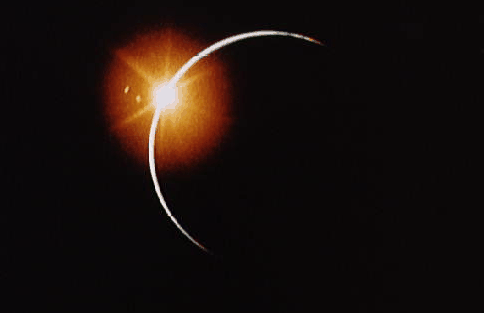The "Really Big" Second Amendment
 "Space is big. Really big. You just won't believe how vastly hugely mind-bogglingly big it is. I mean, you might think it's a long way down the road to the chemist, but that's just peanuts to space."
"Space is big. Really big. You just won't believe how vastly hugely mind-bogglingly big it is. I mean, you might think it's a long way down the road to the chemist, but that's just peanuts to space."With apologies to other law blogs that appropriate from Douglas Adams, I use this quote to conjure-up images of "really big" moments in legal history. "Watersheds" might be another term to use. Specifically, I'm talking about cases that when they come down make a "shock and awe" impact on not only the legal community but society itself. This doesn't necessarily include moments that had a "really big" effect on the law--Chevron is perhaps such an example. I only includes cases that from the moment they are issued send thunderbolts (or atom bombs, panzer divisions, whatever else) across the land.
Although some of us like to think the production of "really big" cases happens every June, these cases actually are very few and far between. Hamdan may have been a bench-slap across the upside of the Bush Administration's head, but there was no clear message, no narrative, that educated non-lawyers could take away and feel "I've just seen history." Perhaps the only case that qualifies in recent years was Lawrence v. Texas, and this might simply be because people understand sexual relations and sexual intimacy much more profoundly than POW camps. As a personal anecdote, I was in the Supreme Court's chamber when Lawrence was announced -- Scalia dissent and all -- and I realized this was a "really big" case when, just as I steped outside and began walking down the Court's steps, when I noticed a respectable (and learned-)looking man (perhaps a lawprof) walking beside me. He was stammering to the woman next to him exclaiming "Wow, this is big! I mean, wow, this is really big!" He seemed like a kid in a candy store.
I'm not sure what other cases in the last few years come to the "really big" level (it is of course a very subjective standard). I'm probably forgetting a bunch of them, although Bush v. Gore and Texas v. Johnson (flag burning) come to mind. (Kelo could too, but it doesn't feel right to me because it didn't really change anything, practically or doctrinally. Its indirect effects may, however.)
So, this long introduction brings me to predict the next "really big" case. It's currently known as Parker v. District of Columbia, for which oral argument is scheduled on December 7, 2006, in the U.S. Court of Appeals for the District of Columbia. What's the case about? As a friend of mine said once: Guns!!!!!!!!!!!!!!!
In quick-and-dirty form, the case is a direct challenge to the District's ban on the possession of handguns, and ban on the possession of functional longarms. Unlike other challenges in the past, the Plaintiffs have carefully only raised Second Amendment claims, and therefore only a standing objection lies in the way of the Circuit Court ruling on the Second Amendment issue. Odds are quite good for the Plaintiffs that they can get around the standing hurdle.
For those of you who don't know, a debate has raged across the legal academy over the last few decades over whether the Second Amendment protects an "individual" right to "keep and bear arms" or merely a "collective" right. I don't want to get into the issue here (many many esteemed faculty members have said all kinds of things about it), but the Supreme Court has never addressed the question (ok, kinda-sorta in one case, but only enough for everyone to argue it supports their side for the next 70 years). And it's a big question. A District of Columbia where it is illegal for civilians to possess functional firearms is, for example, very different from one where it is not.
How the issue gets to the Supreme Court will probably be known sometime next year. The DC Circuit is pretty speedy at issuing its opinions, so if it rules by April or so -- and rules on the merits -- whatever cert. petition is filed would be ready for consideration by the "long conference" of late September, or soon thereafter. Then it would be up to the Court whether it wanted to resolve a Circuit split on the individual/collective rights question, or whether it would like to let sleeping dogs (hell hounds?) lie. (There's a circuit split because the 5th Circuit has gone the individual route, with a few other circuit on the collective side, and a couple that are a bit ambiguous.)
If the Court takes the plung it would mean that the probable "really big" opinion in the "really big" case would be issued in the middle of the 2008 presidential race, making it even more of a "really big" thing. You can just imagine the hysterics on either side of the gun control issue if the Court were to rule one way or the other, a la Lawrence. The hysterics, I dare say, would be "really big."









0 Comments:
Post a Comment
<< Home